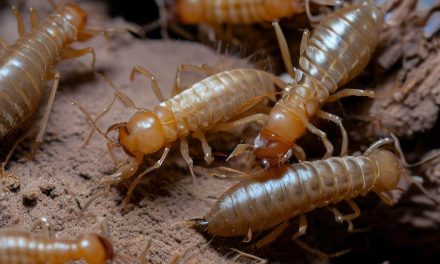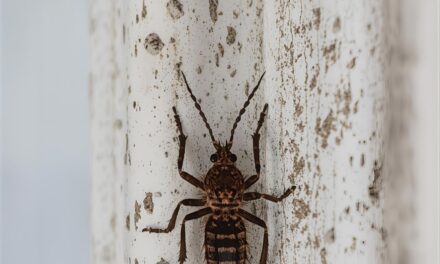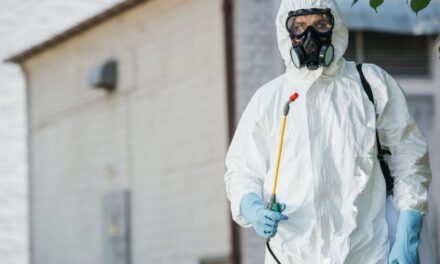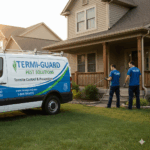Key Takeaways
-
- Termites cause over $5 billion in property damage annually in the U.S., making professional control a crucial investment.
-
- DIY methods are largely ineffective against entire, hidden termite colonies.
-
- Professional services offer advanced treatment options like liquid barriers, baiting systems, and fumigation.
-
- When choosing a service, prioritize licensing, experience, customized plans, and clear warranties.
-
- Local `termite control near me` providers offer faster response times and regional expertise.
- Expect a thorough inspection, detailed proposal, expert treatment, and valuable prevention advice.
Table of contents
Protecting Your Home from the Silent Destroyers with Professional Termite Control Services
Imagine tiny, hidden enemies slowly eating away at your home. That’s what termites are: silent destroyers. These little pests can cause a lot of damage before you even know they are there. They love to munch on cellulose materials like wood, paper, and even fabric. Over time, this eating makes your home’s structure weak and unsafe.
The problem is bigger than many people think. The National Pest Management Association (NPMA) says that termites cause over $5 billion in property damage every year in the U.S. alone. This huge cost shows just how serious the threat is.
Because of this big danger, getting professional termite control services is not just a nice thing to do. It’s a very important way to keep your home safe and sound. It’s a crucial investment in your home’s future.
This guide is here to help you. We will help you understand the termite problem, learn about effective termite treatment options, and show you how to choose the best termite control service for your needs. Whether you’re looking for “termite control near me” or aiming for a top-tier provider, we’ll cover everything to help you protect your most valuable asset.
1. The Unseen Threat: Why Professional Termite Control is Crucial for Your Home
Termites are more than just a nuisance; they are a serious threat to your home’s safety and value. These tiny insects can work non-stop, slowly destroying the wooden parts of your house. This kind of damage can lead to very expensive repairs.
The Severity of Termite Damage
Termites have a huge impact on homes and other buildings. They can eat through floorboards, walls, and even the main support beams of your house. As we learned, the National Pest Management Association (NPMA) estimates that termites cause over $5 billion in property damage each year in the U.S. This staggering figure highlights the need for effective termite control. Without proper management, these pests can quickly turn a small problem into a major disaster for your home’s structural integrity.
Limitations of DIY Termite Control
Many homeowners might think about trying to get rid of termites themselves. However, Do-It-Yourself (DIY) methods are almost never effective for truly stopping a termite problem. Here’s why:
- Surface-Level Solutions: DIY products usually only kill the termites you can see. They don’t reach the main colony.
- Hidden Colonies: Termite colonies are often deep inside walls or underground. You can’t reach them with sprays from a store.
- Specialized Needs: Getting rid of an entire colony needs special tools, knowledge, and strong pesticides that only trained professionals can use safely and effectively.
- Delayed Action: Trying DIY methods can make the problem worse by delaying real, professional help. The termites keep eating while you try things that don’t work.
Experts from the University of California Agriculture & Natural Resources and the EPA warn that effective eradication requires specialized knowledge and equipment. For proper termite control services, professional help is a must.
Long-Term Savings and Peace of Mind
While hiring termite control services might seem like an extra cost at first, it’s actually a smart investment that saves you money in the long run.
- Preventing Future Damage: Professional termite treatment stops termites from causing more harm. This means you avoid costly repairs down the road.
- Thorough Eradication: Experts make sure all the termites are gone, not just the ones you can see.
- Warranties and Guarantees: Many professional companies offer warranties. This means if termites come back within a certain time, they will re-treat your home for free. This gives you great peace of mind.
Purdue University Extension and HomeAdvisor both highlight that this upfront investment leads to significant long-term cost savings by preventing further structural issues. Professional pest management ensures your home is protected and provides you with lasting peace of mind.
2. Understanding the Termite Problem and the Need for Expert Termite Control Services
To fight termites, you first need to understand them. There isn’t just one type of termite, and each type acts differently. Knowing this helps experts choose the right termite control plan.
Key Termite Types and Their Damage
In the U.S., different kinds of termites cause different kinds of problems. Here are the most common ones:
-
- Subterranean Termites:
- Description: These are the most common and damaging type of wood-destroying insect. They live in huge colonies in the soil and need moisture to survive.
- Activity: They build unique “mud tubes” to travel between their underground nests and the wood they eat. These tubes protect them from dry air and predators.
- Damage: Subterranean termites can severely weaken the wooden parts of your home, like foundations, support beams, and floors. They eat wood from the inside out, so the damage is often hidden until it’s very serious.
- Subterranean Termites:
-
- Drywood Termites:
- Description: Unlike subterranean termites, drywood termites live entirely inside the wood they infest. They do not need to be in contact with the soil.
- Activity: You might find them in attic wood, structural timbers, or even furniture. They get all the moisture they need from the wood itself.
- Signs of Damage: A key sign of drywood termites is their distinctive fecal pellets, which look like small, hard grains of sand or sawdust. These are often called “frass.”
- Drywood Termites:
- Dampwood Termites:
- Description: These termites prefer to infest wood that has a high moisture content. This could be decaying logs, stumps, or lumber that is in direct contact with wet soil.
- Activity: They don’t typically build mud tubes, but they are often found in areas with water leaks or poor drainage.
- Damage: While less common in homes than subterranean termites, dampwood termites can cause significant damage to water-damaged wood if conditions are right.
Understanding these different types is crucial because each one requires a specific approach for effective termite control services. The EPA and UC ANR Statewide IPM Program provide more details on these species.
Why DIY Fails Against Termite Colonies
Termite colonies are incredibly large and complex. They can have hundreds of thousands, or even millions, of individual termites. This makes them very hard to get rid of completely without expert help.
- Hidden Nature: Termites are “cryptic,” meaning they hide their activity very well. They often stay out of sight, deep within wood or soil. An untrained person usually only sees a small part of the problem.
- Locating Nests: Finding all the nests, tunnels, and entry points of such a vast colony is nearly impossible without specialized tools and knowledge. The queen, who lays all the eggs, is often deep within the main nest.
- Targeted Treatments: Professional pest management experts have the training and equipment to identify the exact species, find where they are hiding, and apply targeted termite treatment solutions that can reach and destroy the entire colony, including the queen.
Experts at Texas A&M AgriLife Extension and Clemson Cooperative Extension emphasize that professionals have the tools and expertise to tackle these hidden infestations effectively. This is why expert termite control services are so necessary.
3. Exploring Effective Termite Treatment Options Used by Professionals
When it comes to getting rid of termites, there’s no single “magic bullet.” The best way to treat an infestation depends on several things. This is where professional termite control really shines.
Importance of Professional Assessment
Before any termite treatment can begin, a professional assessment is vital. This is because:
- Species Identification: Different termite species require different treatment strategies. A professional can correctly identify the type of termite.
- Infestation Extent: They can figure out how big the termite problem is and how much damage has been done.
- Structure Type: The construction of your home also affects the best treatment method.
- Accurate Diagnosis: A trained expert can accurately diagnose the situation and recommend the most suitable approach for effective pest management.
The EPA and Penn State Extension both stress that a thorough inspection is crucial for an accurate diagnosis and recommending the most suitable approach.
Common and Advanced Termite Treatment Methods
Once the assessment is done, professionals have several powerful tools and methods at their disposal for termite treatment:
-
- Liquid Termiticide Barriers:
- How it Works: This is one of the most common and effective treatments for subterranean termites. Technicians apply a special liquid chemical, called a termiticide, to the soil all around your home’s foundation. This creates a treated zone that termites cannot cross without being exposed to the chemical.
- Modern Approach: Today, many non-repellent termiticides are used. This means termites don’t even know the chemical is there. They walk through it, pick it up on their bodies, and then transfer it to other termites in the colony when they groom each other. This leads to widespread mortality and colony elimination.
- Effectiveness: This method creates a powerful, long-lasting barrier. The UC ANR Statewide IPM Program and Purdue University Extension explain the efficacy of these modern treatments.
- Liquid Termiticide Barriers:
-
- Termite Baiting Systems:
- How it Works: These systems involve placing special bait stations, which are usually plastic tubes, in the ground around the perimeter of your home. Inside these stations is cellulose (termite food) mixed with a slow-acting insect growth regulator (IGR) or another toxicant.
- Colony Elimination: Foraging termites find the bait, eat it, and then share it with other termites in the colony, including the queen. Because it’s slow-acting, the termites don’t realize the bait is harmful until it’s too late, eventually leading to the elimination of the entire colony.
- Use: Baiting systems are often used for monitoring termite activity and as a long-term termite control solution. The EPA and NPMA provide further information on these systems.
- Termite Baiting Systems:
-
- Fumigation (Tenting):
- When Used: This method is mainly used for severe infestations of drywood termites that are spread throughout a structure.
- How it Works: The entire building is covered with large tarpaulins, making it look like a giant tent. Then, a gaseous fumigant (a special gas) is released inside. This gas can go into all the wood in the house, killing all the drywood termites.
- Requirements: While highly effective for total eradication, homeowners must leave their home for several days during the treatment. The UC ANR Statewide IPM Program and Pest Management Professional Magazine detail this process.
- Fumigation (Tenting):
-
- Localized/Spot Treatments:
- When Used: For smaller, contained infestations of drywood termites, professionals can use localized treatments.
- How it Works: This involves directly injecting liquid insecticides into the infested wood where termites are known to be. It’s a precise way to target specific problem areas.
- Localized/Spot Treatments:
- Physical Barriers:
- When Used: These are typically installed during a home’s construction (pre-construction).
- How it Works: Physical barriers, like special stainless steel mesh or a layer of sand that termites cannot tunnel through, are installed in the foundation to prevent termites from entering the building in the first place. These provide a long-lasting, non-chemical preventative measure.
- Building Codes: The EPA and building codes often recognize these as effective preventative measures.
Choosing the right termite treatment plan is a complex decision that skilled termite control services can navigate with expertise.
4. How to Identify and Choose the Best Termite Control Service
Finding the best termite control service is a crucial step in protecting your home. This section will guide you through what to look for, ensuring you make an informed decision and find a reliable partner in home protection.
Experience and Licensing are Paramount
When entrusting your home’s safety to a pest control company, their credentials matter most.
- State and Local Licensing: Always check that the company is licensed by your state’s agricultural department or other relevant authority. This ensures that their technicians have proper training and meet professional standards for using pest control products. For example, in California, you’d check with the Structural Pest Control Board.
- Certifications: Look for certifications from industry groups like the National Pest Management Association (NPMA). These show a company follows the best and safest practices in pest management.
- Experience: A company with a long history of serving your area will know a lot about the local termite species and common ways they infest homes. This local knowledge is invaluable for effective termite control.
Comprehensive Inspection Process
A truly reputable company providing termite control services won’t guess at your problem. They will perform a thorough inspection.
- What to Expect: A good inspector will carefully check every part of your home – inside, outside, in crawl spaces, and even in the attic. They are looking for all signs of termite activity, the specific species, and any damage already done.
- Clear Communication: They should clearly explain what they found, show you any evidence, and answer all your questions.
- Why it Matters: A detailed inspection, as recommended by the NPMA and Consumer Reports, is the foundation for an effective termite treatment plan.
Customized Termite Treatment Plans
Be wary of companies that offer a generic solution for every home. Every termite problem is unique.
- Tailored Solutions: The best termite control service will provide a detailed plan specifically for your home and your termite problem.
- What the Plan Should Include: This proposal should clearly explain the recommended termite treatment methods, why they chose them, what results to expect, and any potential risks.
- Expert Advice: The EPA and University Extension Services emphasize that customized plans are essential for successful pest management.
Guarantees and Warranties
A trustworthy company stands behind its work.
- Re-treatment Guarantees: Most good companies offer service agreements that include guarantees. If termites return within a certain period (often 1-5 years), they will come back and re-treat your home at no extra cost.
- Repair Warranties: Some companies even offer repair warranties, covering new damage if termites reappear after treatment.
- Understand the Details: Always read and understand the terms and conditions of these warranties. HomeAdvisor and Consumer Reports highlight the importance of these protections.
Reputation and Customer Reviews
A company’s past performance often predicts its future service.
- Online Research: Check online reviews on sites like Google, Yelp, and the Better Business Bureau (BBB). Look for patterns in what people say about their service, reliability, and effectiveness.
- References: Don’t hesitate to ask the company for references from past customers.
- Track Record: A company with a strong track record of happy customers usually provides reliable and high-quality termite control services. Angie’s List and the Better Business Bureau are good places to start your research.
Transparency in Pricing and Contract Terms
Clear communication about costs and contracts is essential to avoid surprises.
- Detailed Estimates: Get a written estimate that clearly shows all costs, what services are included, how often treatments will happen, and all warranty details.
- Beware of Low Bids: Be cautious of bids that are much lower than others. This could mean incomplete service, hidden fees, or cutting corners.
- Contract Clarity: Understand the full length of the contract and any renewal clauses. The Federal Trade Commission and Consumer Reports advise checking all terms.
Use of Safe and Environmentally Responsible Methods
Your family’s and pets’ safety, as well as the environment, should be a priority.
- Ask About Products: Ask the company about the pesticides they use. Inquire if they are safe for children and pets and what their environmental impact is.
- IPM Principles: Reputable companies often follow Integrated Pest Management (IPM) principles. This means they prioritize effective solutions that pose the least risk, aiming for smart termite treatment that protects your family and the planet.
- Reliable Sources: The EPA and Beyond Pesticides offer insights into safe pest management practices.
Ongoing Monitoring and Follow-up Services
Termite control is often an ongoing process, not a one-time fix.
- Continuous Protection: Ask about follow-up inspections and what their service agreement includes for preventative measures and maintenance plans. This ensures long-term termite control.
- Regular Checks: Many companies offer annual or semi-annual checks to make sure termites don’t come back. Purdue University Extension emphasizes the need for ongoing vigilance.
By carefully considering these points, you’ll be well-equipped to choose the best termite control service that offers effective termite treatment and long-term protection for your home.
5. Finding Termite Control Near You: Local Expertise Matters
When termites attack, you often want help fast. Finding “termite control near me” means you can get quick service from people who know your local area well.
Tips for a Local Search
Here’s how to find great termite control services right in your neighborhood:
- Online Search Engines: Use very specific search terms. Try “termite control [your city]” or “termite control [your zip code].” You can also use “pest control near me” and then filter for termite services.
- Local Directories: Check local business listings online, in old-fashioned phone books, or community forums. These often highlight businesses that serve your specific area.
- Recommendations: Ask people you trust! Neighbors, friends, or local real estate agents often have good suggestions for reliable `termite control near me` companies. They might have used someone they liked. HomeAdvisor and local business guides are great resources for finding local providers.
Benefits of Hiring a Local Company
Choosing a local `termite control near me` company offers several clear advantages:
- Faster Response Times: When you have a termite emergency, a local company can often come out much quicker to inspect your home and start termite treatment. They don’t have to travel far.
- Familiarity with Regional Issues: Local experts know a lot about the specific types of termites common in your area. They understand the local environment, like soil types or weather patterns, that affect termite activity. This knowledge is crucial for picking the most effective termite treatment plan.
- Accessibility for Follow-up: It’s much easier to schedule follow-up visits and keep a good, ongoing relationship for your termite control services with a company that’s close by.
- Local Reputation: Local businesses often rely on word-of-mouth and community trust. This means they are highly motivated to provide the best termite control service possible to maintain their good standing in the community.
Checking Local Licensing and Insurance
Just like with any service, it’s super important to double-check the credentials of any `termite control near me` company.
- Verify Licenses: Always confirm that the company is properly licensed to operate in your specific city, county, and state. This ensures they meet all local rules and standards.
- Proof of Insurance: Make sure they have liability insurance. This protects you in case of any accidents or property damage that might happen during the termite treatment process.
- Consumer Protection: Your state and local consumer protection agencies can help you verify these details.
By focusing on `termite control near me`, you can find a responsive and knowledgeable partner for expert termite control services who truly understands your specific challenges.
6. What to Expect When You Engage Termite Control Services
Once you’ve chosen a professional team, what happens next? Knowing the steps involved in termite control services can help you feel prepared and confident in the process.
Initial Contact and Inspection
The journey to a termite-free home starts with your first call.
- Your Call: You reach out to the termite control services company to explain your concerns or suspicions about termites.
- Inspector Visit: A qualified termite inspector will then schedule a visit to your home.
- Thorough Visual Inspection: During this visit, they will perform a careful visual inspection. They will look for:
- Mud tubes (tunnels made by subterranean termites).
- Damaged wood (which might look hollow or have tunnels inside).
- Fecal pellets (frass) from drywood termites.
- Shed wings (often seen near windows or lights).
- Other subtle signs of termite activity.
- Species Identification: The inspector will identify the type of termite causing the problem and figure out how far the infestation has spread.
This initial stage is crucial, as highlighted by the NPMA and Orkin.
Detailed Proposal and Explanation
After the inspection, the company should give you a clear plan.
- Written Proposal: You should receive a detailed written proposal. This document is very important.
- What it Details: The proposal should include:
- The exact type of termites found.
- The recommended termite treatment methods, and a clear explanation of why those methods are best for your situation.
- Information about the specific chemicals or baits they plan to use.
- A breakdown of the estimated cost for all services.
- Full details about the warranty and how long it lasts.
- Any steps you, as the homeowner, need to take to prepare for the treatment.
- A timeline for when the treatment will take place.
Implementation of Control Methods
Once you approve the plan, the technicians get to work.
- Scheduled Treatment: The termite treatment will be scheduled and carried out by skilled technicians.
- Treatment Steps: This might involve various techniques depending on the chosen plan:
- Drilling: Creating small holes in concrete slabs or foundations to inject liquid termiticide.
- Trenching: Digging narrow trenches around your foundation to create a liquid barrier.
- Bait Station Installation: Placing bait stations in the ground around your home.
- Fumigation (Tenting): If needed for drywood termites, the house will be tented and fumigated, requiring you to vacate temporarily.
- Safety First: The technicians should always communicate safety precautions and give you clear instructions for what to do during and after the termite treatment. The EPA provides guidance on safe pest control applications.
Post-Treatment Inspection and Prevention Advice
The service doesn’t end when the treatment is done.
- Follow-up Check: After the initial termite treatment, a good company will often perform a follow-up inspection to make sure the treatment worked and there are no more signs of termites.
- Prevention Tips: They should also give you advice on how to stop future termite infestations. This advice might include:
- Fixing leaky pipes or faucets.
- Improving drainage around your home to reduce moisture.
- Removing any wood that is touching the soil.
- Clearing away wood debris, old stumps, or excess mulch near your foundation.
Purdue University Extension emphasizes the importance of these preventative measures.
Ongoing Maintenance Plans
For lasting protection, many termite control services offer continuous support.
- Annual Monitoring: Many companies provide annual or semi-annual inspection and maintenance plans. These plans are especially important in areas where termites are a big problem.
- Maintaining Barriers: These plans help monitor for any new termite activity and ensure that protective barriers remain effective. This continuous care is key to long-term termite control. HomeAdvisor and Consumer Reports both highlight the value of ongoing maintenance.
By understanding these steps, you can feel confident and knowledgeable throughout the process of engaging professional termite control services.
7. Conclusion: Secure Your Home with Professional Termite Control Services
Termites are more than just a nuisance; they are a significant threat to your home’s safety and value. Protecting your most important investment from these silent destroyers truly requires the skill and experience of professional termite control services. Trying to handle a termite infestation yourself can often lead to more damage and higher costs in the long run.
To find the best termite control service, remember these key takeaways:
- Prioritize Credentials: Always choose companies that are licensed, experienced, and hold industry certifications.
- Demand Customization: Insist on a personalized termite treatment plan tailored to your home’s unique needs, not a one-size-fits-all solution.
- Look for Guarantees: Ensure the service comes with clear warranties and guarantees for re-treatment and, ideally, repairs.
- Check Reputation: Research their track record through customer reviews and local references.
- Insist on Transparency: Get detailed, written estimates and fully understand all contract terms.
- Ask About Safety: Inquire about their use of safe and environmentally responsible methods.
- Consider Local Expertise: For quicker responses and knowledge of regional issues, look for “termite control near me.”
Don’t wait for visible signs of extensive damage to appear. Proactive inspection and timely professional intervention are the keys to safeguarding your home. Contact a trusted termite control service for an inspection or quote today to protect your most valuable asset from these persistent pests, ensuring lasting peace of mind.
Frequently Asked Questions
-
- Q: How much damage can termites really cause?
A: Termites can cause significant structural damage to homes, with the National Pest Management Association (NPMA) estimating over $5 billion in property damage annually in the U.S. This damage is often hidden until it becomes severe.
- Q: How much damage can termites really cause?
-
- Q: Why shouldn’t I try to get rid of termites myself with DIY products?
A: DIY methods typically only address visible termites and rarely reach the entire hidden colony, especially the queen. Effective eradication requires specialized knowledge, tools, and powerful, targeted treatments that only professionals can apply safely and effectively.
- Q: Why shouldn’t I try to get rid of termites myself with DIY products?
-
- Q: What are the main types of termite treatments available from professionals?
A: Professionals use several methods, including liquid termiticide barriers applied around the foundation, baiting systems that attract and eliminate entire colonies, and fumigation (tenting) for severe drywood termite infestations. Localized treatments and physical barriers are also used.
- Q: What are the main types of termite treatments available from professionals?
- Q: What should I look for when choosing a termite control company?
A: Key factors include state and local licensing, industry certifications (like NPMA), extensive experience, a comprehensive inspection process, customized treatment plans, clear warranties/guarantees, strong customer reviews, transparent pricing, and the use of safe pest management methods.










